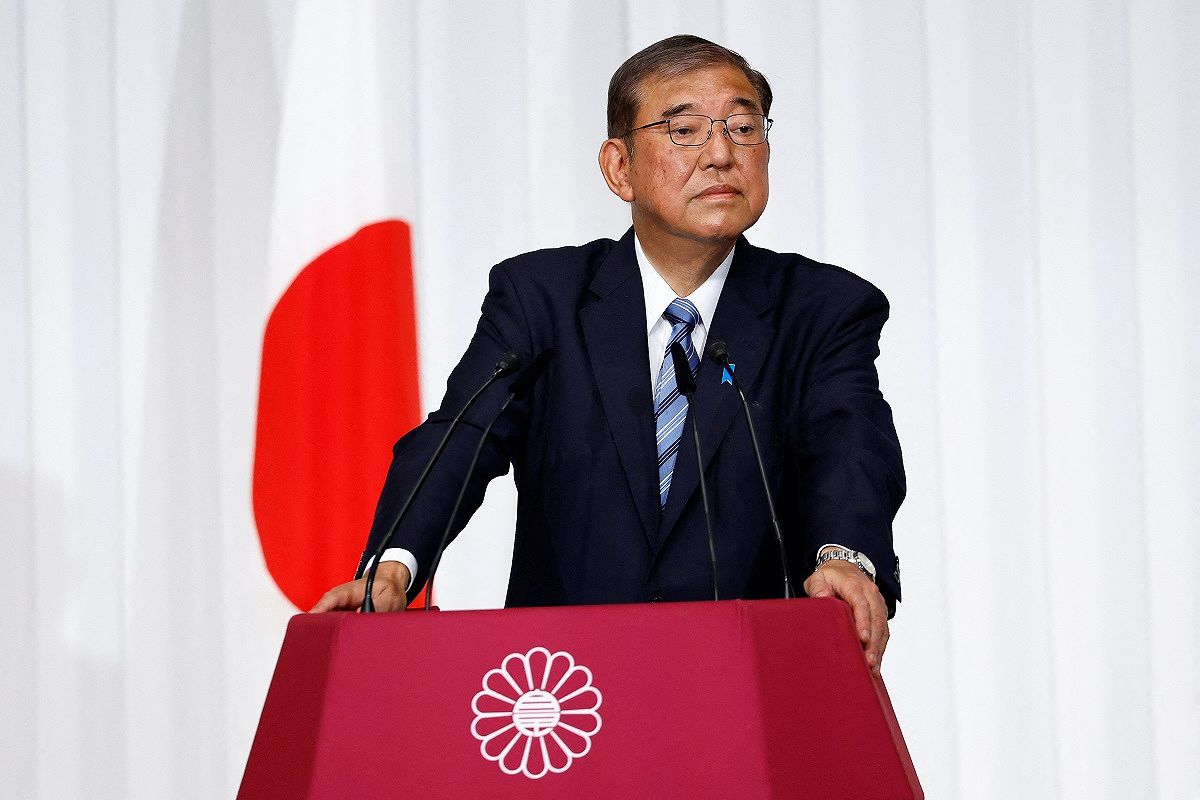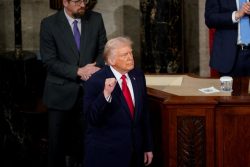
Japanese Prime Minister and leader of the ruling Liberal Democratic Party (LDP) Shigeru Ishiba looks on as he speaks during a press conference a day after Japan’s lower house election, at the party’s headquarters in Tokyo, Japan October 28, 2024.
9:56 JST, November 11, 2024
TOKYO, Nov 11 (Reuters) – Japanese lawmakers decide on Monday whether Prime Minister Shigeru Ishiba remains the country’s leader after his scandal-tarnished coalition lost its parliamentary majority in a lower house election late last month.
Ishiba, who called the snap poll after coming into office on Oct. 1, is expected to prevail as his Liberal Democratic Party and coalition partner Komeito won the biggest block of seats in the election, while losing the majority held since 2012.
Even so, Ishiba then faces the prospect of running a fragile minority government as protectionist Donald Trump regains control in Japan’s main ally the U.S., tensions rise with rivals China and North Korea, and public pressure mounts at home to tackle a cost of living crunch.
The small opposition Democratic Party for the People has emerged as a kingmaker after the election, declining to enter a formal coalition with the LDP but saying it may offer support on a policy-by-policy basis.
In a sign of the challenges Ishiba may face in pushing through his policy agenda, DPP chief Yuichiro Tamaki told reporters on Friday that party members would not vote for Ishiba at Monday’s special parliamentary session.
“Until now the LDP and Komeito have been able to push their policies through and they are no longer able to do that, they have to listen to the opposition parties,” he said.
Former Prime Minister Yoshihiko Noda, the head of the opposition Constitutional Democratic Party, the biggest party after the LDP, is also expected to be among the candidates put forward as premier.
If, as expected, no candidate wins a majority initially, a runoff between the top two contenders will determine the winner. Such a runoff has not been held in 30 years, underlining the fragility of Japan’s leadership.
CHALLENGES AHEAD
Japan will hold elections next year for the less-powerful upper house, where the ruling coalition’s slim majority could also be at risk if Ishiba cannot revive public trust in his administration, which has been roiled by a scandal over unrecorded donations to lawmakers.
The most imminent challenge he faces is compiling a supplementary budget for the fiscal year through March, under pressure from voters and opposition parties to raise spending on welfare and measures to offset rising prices.
Ishiba also has a slate of international engagements, including a summit of the Group of 20 big economies in Brazil Nov. 18 and 19. He is trying to arrange a stopover in the United States around the G20 summit to meet Trump.
Some Japanese officials fear that Trump might again hit Tokyo with protectionist trade measures and revive demands for it to pay more toward the cost of stationing U.S. forces in the country.
These issues were largely smoothed over in Trump’s first term, from 2017 to 2021, by the close ties between the president and Japan’s then-premier, Shinzo Abe – a bond Ishiba seems keen to re-establish.
Top Articles in News Services
-

Survey Shows False Election Info Perceived as True
-

Hong Kong Ex-Publisher Jimmy Lai’s Sentence Raises International Outcry as China Defends It
-

Japan’s Nikkei Stock Average Touches 58,000 as Yen, Jgbs Rally on Election Fallout (UPDATE 1)
-

Japan’s Nikkei Stock Average Falls as US-Iran Tensions Unsettle Investors (UPDATE 1)
-

Trump Names Former Federal Reserve Governor Warsh as the Next Fed Chair, Replacing Powell
JN ACCESS RANKING
-

Producer Behind Pop Group XG Arrested for Cocaine Possession
-

Japan PM Takaichi’s Cabinet Resigns en Masse
-

Man Infected with Measles Reportedly Dined at Restaurant in Tokyo Station
-

Israeli Ambassador to Japan Speaks about Japan’s Role in the Reconstruction of Gaza
-

Videos Plagiarized, Reposted with False Subtitles Claiming ‘Ryukyu Belongs to China’; Anti-China False Information Also Posted in Japan

























